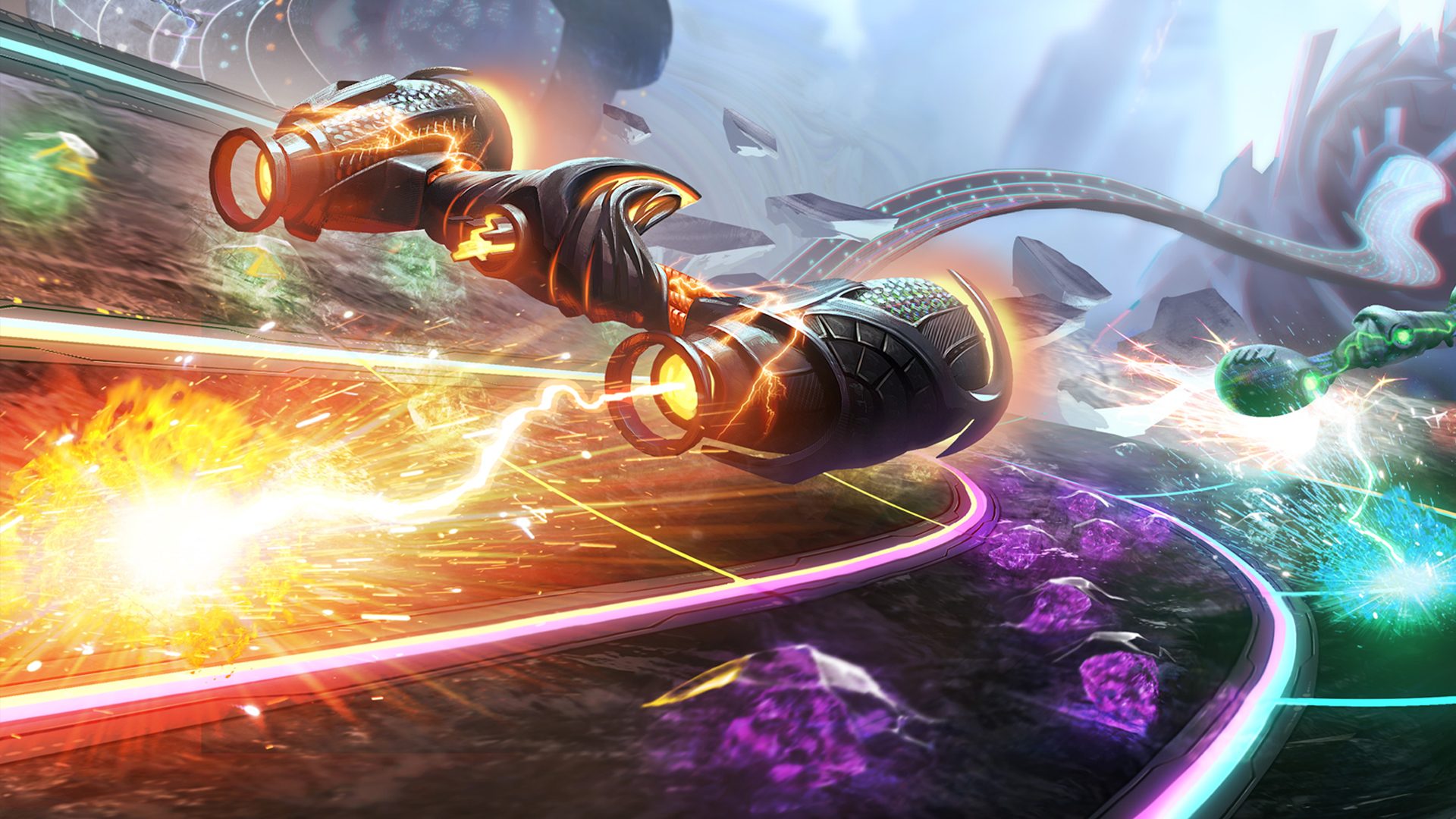GamesRadar+ Verdict
Improved lane-hopping controls and fun multiplayer make this a blast to play, but it's as an interactive music album where new Amplitude really shines. You need to experience it.
Pros
- +
A brilliant original electronica album in its own right
- +
New active track seeking controls are very welcome
- +
Audio-visual fidelity is superb
- +
Local multiplayer is a blast
- +
Rewards increased skill with greater involvement
Cons
- -
Visuals and difficulty can be overwhelming
Why you can trust GamesRadar+
Amplitude feels like an album from the future. You are the conduit through which the visuals and audio flow, into each other, around you and through you. Mechanically, Amplitude is fundamentally similar to Harmonix's other rhythm action output like Rock Band, in that notes fly towards you and you must press a corresponding button to trigger them in time with the beat. Drop one note in a sequence and that part of the music (be it drums, synth, vocals or what-have-you) is muted. So in order to hear everything in the track, you have to keep each channel of sound active. And you'll really want to do so, because - unlike Rock Band - the music in Amplitude's campaign mode was composed specifically for the game.
In essence, you are playing a 15-song concept album that explores the idea of synaesthesia in the mind of a comatose female. To say the idea is unusual is an understatement, but it's executed brilliantly. The story is told across 15 levels of high-quality electronica through snatches of doctors' conversations, lyrics and menu screen text, while you reconnect the synapses and attempt to bring her back to consciousness. It's a fantastic premise for a game and fits the rhythm-action gameplay perfectly.
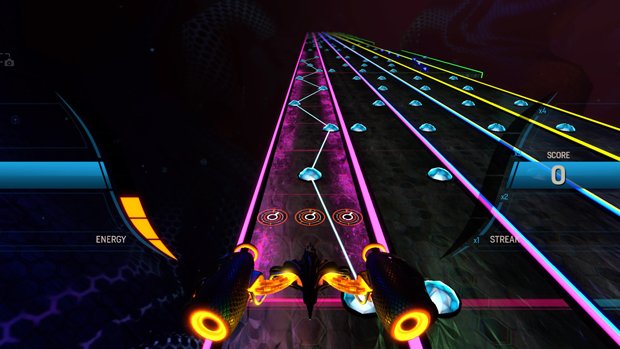
Musically, it's top-notch, mostly entrenched in trance with hints of dubstep, reined back in with some commendably deep lyrical content and glittering sparkles of 8-bit filtering. The audio production is flawless, yet failing a lane and letting tracks fall out of the mix is sometimes a good thing, at least from a user experience perspective if not your score, as it allows you to hear harmonies and rhythm patterns that would otherwise have been lost in the soundscape. You'll be reaching for the Volume Up button so that you can envelop yourself still further in its cool aural waters. I did. There's a track about a magpie. What can I say? It's terrific.
Even though it's impossible to guarantee you'll personally like the music (as music is even more divisive than games when it comes to opinion and taste), the way the sound is married to the visuals is captivating, whether you're a fan of electronica or not. The warping HD iconography is as much a playable music video for that entire album as it is a game interface, and one that would grab your attention if you saw it on TV. Very much like classic Rez, the abstract visuals of pulsing lights, colours and shapes are woven into every bar of music, and your journey through the firing synapses of a damaged yet riotously active mind is enthralling.
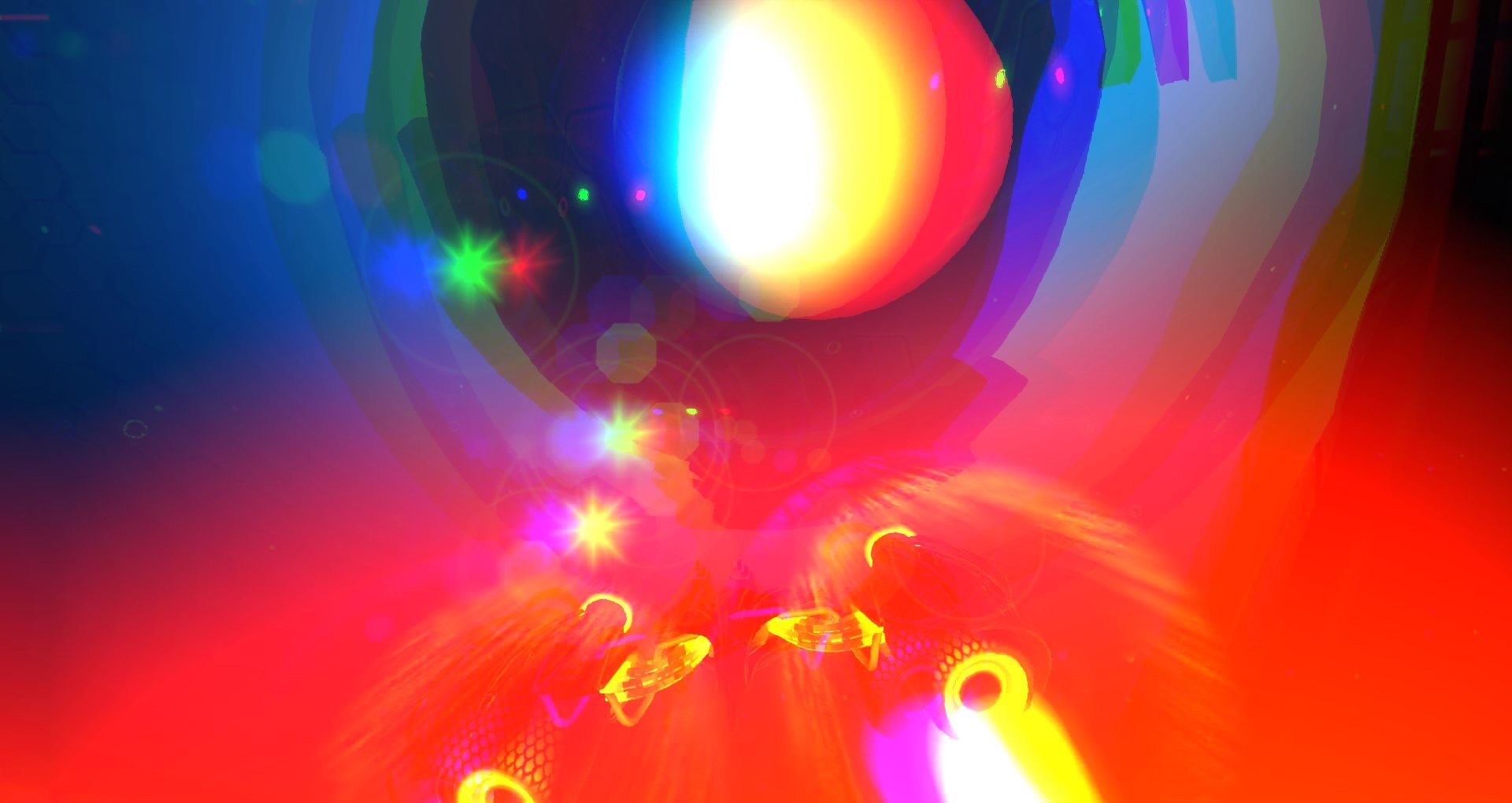
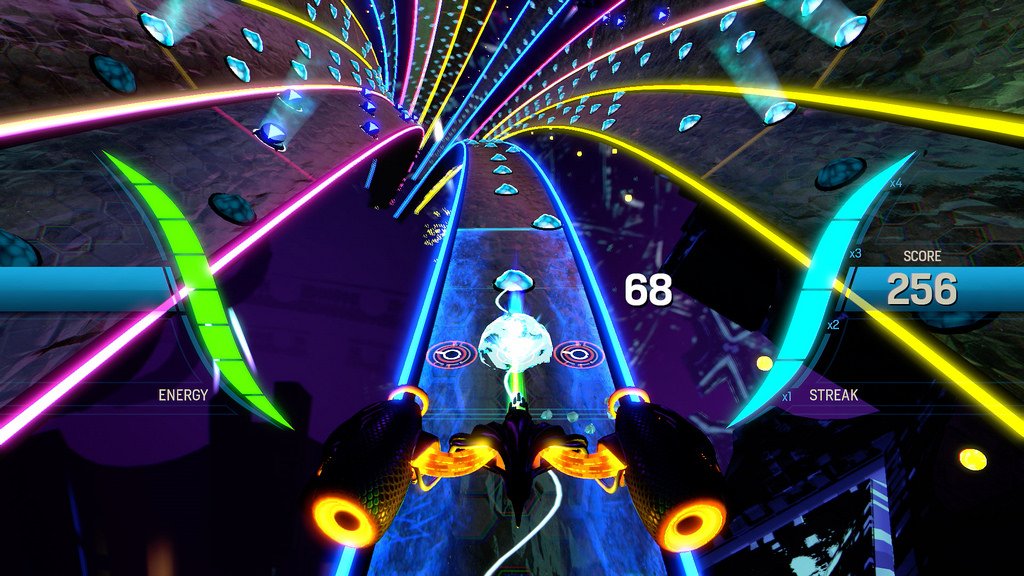
Once you finish the regular campaign mode, you unlock the ability to turn on FreQ mode. This swaps the flat-laned layout of Amplitude for the rotating tunnel of the original game's predecessor, FreQuency. It doesn't make a ton of difference to the gameplay, but it looks nice. Sadly, however, it only works in single-player, as the tunnel has to rotate to keep the player at the bottom of the screen. Since everyone plays on the same screen, not split, attempting a lane upside-down would surely be too hard. So probably for the best.
With only three notes ever being thrown at you, the gameplay would likely become too simplistic if it wasn't for the need to juggle those different parts. You do this by hopping lanes, which is where the biggest gameplay challenge first comes along. You can always see a new lane starting on the horizon, and the location of the first beat is visible too, meaning as soon as your current lane is completed, you can then hop over to the next one and push the correct button in time with the first beat and keep your streak going. At first, it seems too much to think about as you just try to deal with the sequence you're on, but it's amazing how quickly you learn to predict lane changes, and immensely rewarding when you nail a split-second jump.
To help in these moments of panic, the controls have been tweaked for this version of Amplitude over the 2003 original, as there's now a 'streak seeker' feature, which means one push of left or right will jump to the next available lane, rather than having you manually jump across empty lanes in sequence. The old way is available still if you like it, but now streak seeker is in, I wouldn't want to go back.
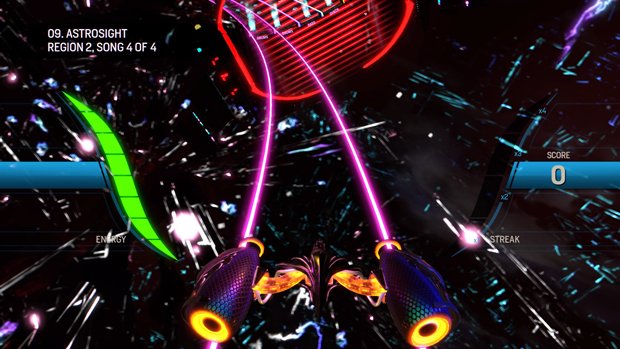
However, I do wish the controls were more intuitive. Since there are only three notes in any one lane, it makes no sense whatsoever to have L1 be the left one, R1 be the middle and R2 the right one by default. There are plenty of alternatives as well as custom mapping, and I found a good scheme until I reached higher difficulty levels and then it all fell apart pretty quickly. It's just not as intuitive as Guitar Hero's basic 'one note under each finger' control scheme.
Even so, you'll surprise yourself with some of the runs your fingers will complete once you get into the zone, partly thanks to the pleasantly forgiving timing detection on note hits. Keeping an expert track alive, even for a few sequences, feels akin to a small lottery win. Even so, the game undoubtedly loses some of its majesty when you're concentrating too hard on doing well. The core album is arguably a more enjoyable experience when you're in control of the game instead of frantically trying to keep up with it. On beginner, it's positively relaxing.
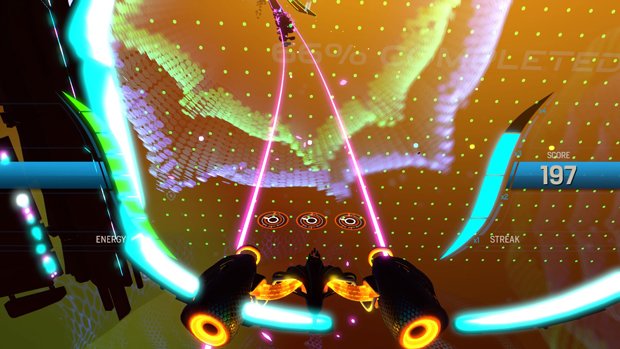
There are plenty of extra songs besides the main album for Quickplay, with more unlocking as you progress, with up to 4-player local multiplayer available on every song. Competitive play adds a new dimension thanks to some opponent-bothering power-ups, as instead of split-screen, you all play on the same game field. The player that occupies a track first is given the lead, but they can be warped to a different lane if another player zaps them from behind with the right weapon power up. Getting warped out in the middle of a good streak is infuriating, but hitting back with the distortion power up - which turns your assailant's lane into an ocean of confusing waves and ripples - is gleefully wicked. If everyone's similarly enthralled with the experience, there should be a lot of legs in this as a party game.
But I don't think everybody will be. The visuals can be a little too abrasive at times – especially on the last level of the campaign – and the disparity in difficulty between, say, the drum track and the vocals can make for a frustrating experience. You could argue that it's risk vs reward in a competitive, score attack-based game, but if you simply can't do it, you won't have fun.
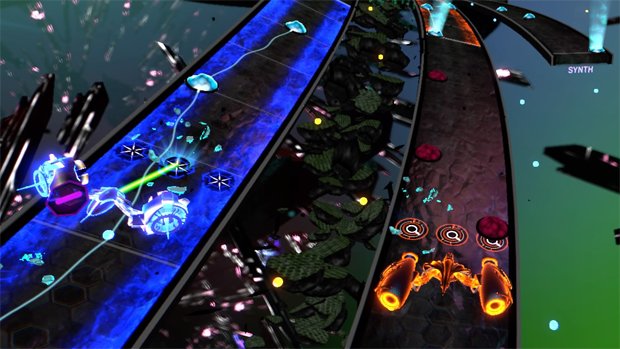
The fact that Amplitude has only arisen from its own coma thanks to crowdfunding says a lot about its niche appeal. It just isn't as mainstream as Guitar Hero/Rock Band, but that makes it so much cooler. It's like a cult classic underground album: revered by those in the know, but far too hip to be mainstream. And as a new way to experience original music, this simply has to be sampled. Its feel changes as your competence grows, which brings a very pleasant new meaning to the old saying 'this album gets better with every play'.
This game was reviewed on PS4. The writer did not back the game on Kickstarter.
More info
| Description | Return to the classic beat-matching gameplay of the original PS2 game with fresh graphics, new songs, and co-op gameplay. |
| Platform | "PS3","PS4" |
Justin was a GamesRadar staffer for 10 years but is now a freelancer, musician and videographer. He's big on retro, Sega and racing games (especially retro Sega racing games) and currently also writes for Play Magazine, Traxion.gg, PC Gamer and TopTenReviews, as well as running his own YouTube channel. Having learned to love all platforms equally after Sega left the hardware industry (sniff), his favourite games include Christmas NiGHTS into Dreams, Zelda BotW, Sea of Thieves, Sega Rally Championship and Treasure Island Dizzy.
